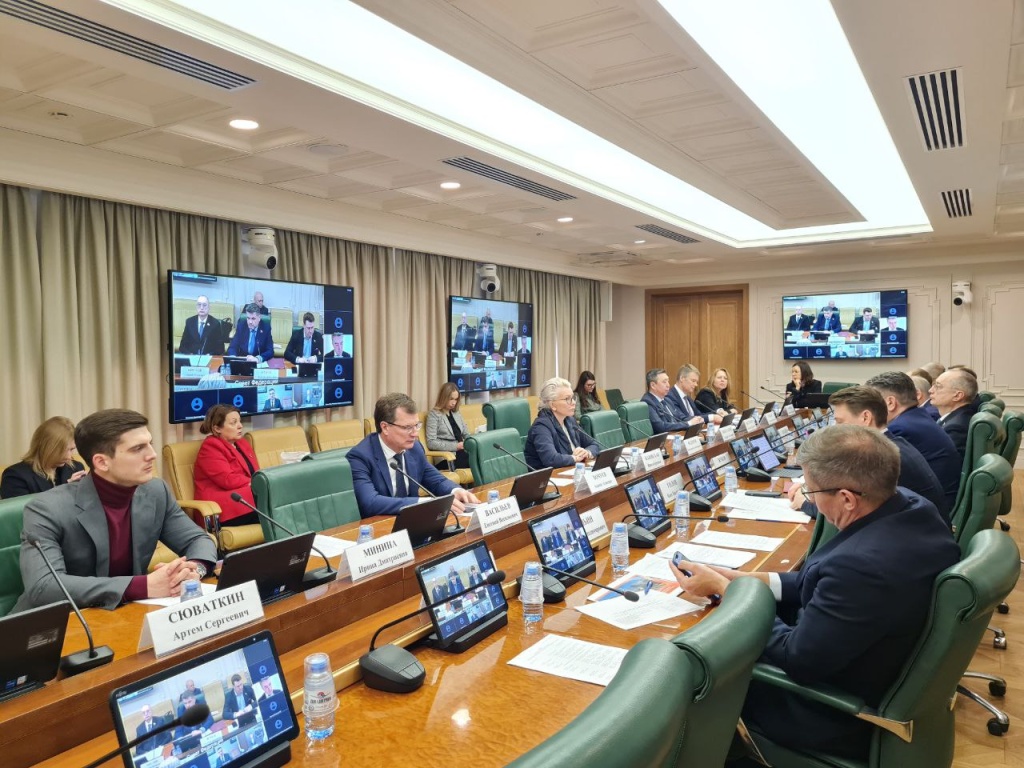26.02.2024 - Aluminium Association
The aluminium industry has faced unprecedented external pressure and adverse market conditions. These were caused by the closure of Western markets for Russian aluminium, the cessation of alumina supplies, and the fall in exchange prices for the metal. This was stated by Alexander Zhukov, a member of the Federation Council Committee on Economic Policy, during a round table on 'Development of domestic demand for aluminium products as a driver of technological sovereignty' in the Federation Council. It was attended by representatives from various ministries, federal agencies and departments, as well as companies that use and make aluminium and products made from it.
Alexander Zhukov: 'We believe that there is a huge potential for using aluminium structures in various industries, such as construction, energy, aviation, mechanical engineering, and others.' He also pointed out that the industry is currently facing external pressure and challenging global circumstances. These include the closure of Western markets, disruptions in the supply chain, falling stock prices, and the introduction of export duties.

In her turn, Irina Kazovskaya, the Co-Chair of the Russian Aluminium Association, highlighted that despite the challenges facing the industry, the consumption of aluminium products in Russia has increased by 60% since 2016 and now stands at 1.15 million metric tonnes per year. The domestic aluminium industry accounts for 1.5% of the GDP. Russia ranks second in terms of primary aluminium production, behind China. Between 2016 and 2023, the per capita internal consumption of aluminium in Russia rose from 3.5 kg to 10 kg. This indicator is customarily used to assess the level of industrial development in a country. Meanwhile, the Russian aluminium market has the potential to expand to at least 2 million metric tonnes. This is due to the rising demand in all sectors that use aluminium.
'Achieving technological sovereignty requires the advancement of high-tech sectors such as energy, automotive, and aviation. However, developing these sectors is impossible without advancing the deep processing of aluminium and creating competencies at all levels of the processing stream,' said Irina Kazovskaya.
The current Action Plan to boost demand for aluminium products in the period up to 2025 and beyond, approved by Denis Manturov, the Deputy Prime Minister of the Russian Federation and Minister of Industry and Trade, is designed to achieve a double-digit increase in domestic aluminium consumption. Implementing this initiative will boost the creation of high-tech products made from aluminium. It will also help expand production facilities and create new capacities, as well as develop new competencies. By implementing Article 9 of the Plan alone, the annual consumption of aluminium should increase by 30,000 metric tonnes. The growth of domestic demand will bring new jobs and revenues for regional budgets. Additionally, it will enhance the export potential of products.
'The key to our country's successful development lies in the development of its regions. We believe that the growth of consumption should come from the regions. This will benefit both the aluminium industry by creating more demand and the regions themselves. The regions will receive modern, environmentally sound solutions for infrastructure and social projects. Additionally, it will create more incentives for the development of industrial companies in the regions,' stated Irina Kazovskaya, Co-Chair of the Russian Aluminium Association.
The environmental and economic advantages of aluminium are most evident when we look at the total cost of a building over its entire life cycle. It is also important to consider the total cost of ownership and operation of buildings and structures over their entire life cycle. More than 75% of this total cost is accounted for by operating expenses. According to experts, the use of more efficient solutions, although it may initially increase the cost, can usually reduce the cost of the entire life cycle by 1.5 to 2.5 times.
A representative of the Russian Ministry of Energy highlighted that aluminium is a crucial component in maintaining technological independence and ensuring the uninterrupted operation of the country's energy system. Aluminium alloys are commonly used in the construction and renovation of power lines. Russian companies widely use aluminium products, and the industry's demand for them until 2030 is estimated to be tens of thousands of tonnes.
According to the representative of Avtodor Group, one of the most promising applications of aluminium in road infrastructure is in noise screens. This year, 43,000 square metres of them were installed on the M12 highway alone. Aluminium is also in demand for the manufacturing of LED lamps and lighting poles.
The roundtable discussion was attended by Senators Oleg Golov and Andrey Kislov, as well as representatives from the Ministry of Energy of the Russian Federation, the Ministry of Construction of the Russian Federation, consumer companies, and experts. Based on the results of the round table, a resolution will be published regarding the continued pursuit of goals in achieving technological independence and promoting regional development.

